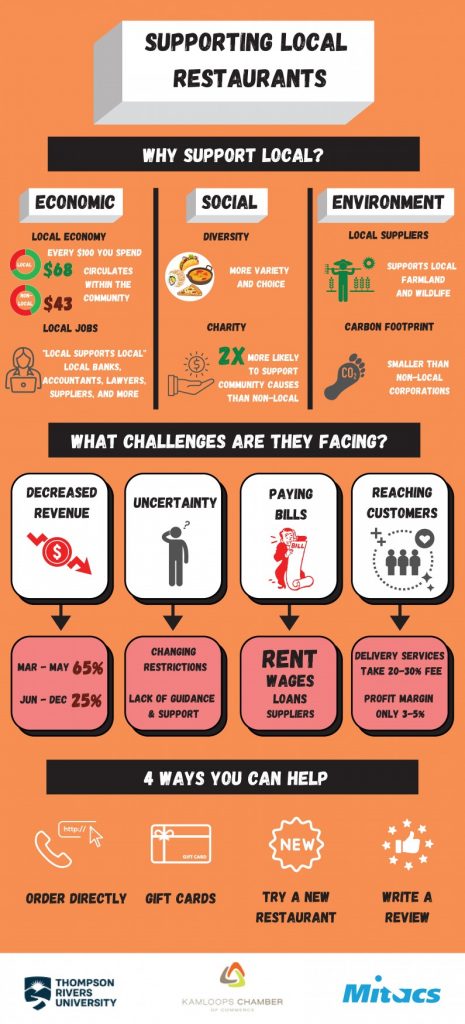
Business student Josh Parker spent a lot of time working in the restaurant industry while going to university, so when restaurants were forced to shut down due to the COVID-19 pandemic he was concerned about what it would mean for local businesses.
Working with faculty supervisor Terry Lake and supported by Mitacs, the Kamloops Chamber of Commerce, and the School of Business and Economics through a Business Strategy Internship, Parker set out to find out how the pandemic was impacting local restaurants.
Diversification benefits business
Through surveys, interviews and roundtable discussions with customers, employees and restaurant owners, Parker discovered that the restaurants that have fared the best during the pandemic were those that diversified operations, meaning they had more streams of revenue to draw upon. This meant enhancing takeout options, offering catering or personal chef experiences, or in some cases, selling specialty ingredients with instructions for at-home preparation.
Parker also found customers want to support the industry and would support price increases of up to 15 percent, however, in contradiction, they also reported that their No. 1 negative experience was the cost of ordering in. This highlights a lack of awareness on part of the consumer, he says.

Customers still unclear about where money goes
“Being open and transparent with your customers will create a more supportive and understanding group that will help you get through the uncertain road that lies ahead,” he says.
“In speaking with owners, it was interesting because they all expressed similar concerns with takeout and delivery services,” Parker says, referring to online ordering platforms like SkipTheDishes and DoorDash, which were able to charge local restaurants 20 percent or more on orders up until last month when the Province of BC temporarily capped the fees.
He suspects that if clients knew where the money was going, they’d be more inclined to support temporary price increases in order to keep their favourite restaurants afloat.
Parker developed a series of surveys which he distributed to the general public, as well as to restaurant owners and employees. The biggest challenge he faced in the data collection process was tracking down a large sample size in an employee group that was in the midst of massive disruption.
“We were only able to survey about 30 employees, which wasn’t what we wanted, but we were also able to speak with several owners who took 20-30 minutes out of their very hectic days to speak with us,” he says.
He had significant buy in from customers, with 160 survey responses.
Parker’s research will be shared to restaurant owners through the Kamloops Chamber of Commerce, and he hopes it will provide insights that will help smooth the road to economic recovery.
More information
Danna Bach, research communications
dbach@tru.ca

